Waco F series
The Waco F series is a series of American-built general aviation and military biplane trainers of the 1930s from the Waco Aircraft Company.
| Waco F series | |
|---|---|
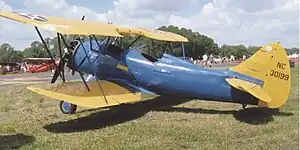 | |
| ex US Civilian Pilot Training Program 1941 Waco UPF-7 | |
| Role | open-cockpit biplane |
| National origin | United States |
| Manufacturer | Waco Aircraft Company |
| Introduction | 1930 |
| Status | YMF-5 in production (2013) |
| Primary user | private pilot owners and training schools |
Development
The Waco 'F' series of biplanes supplanted and then replaced the earlier 'O' series of 1927/33. The 'F' series had an airframe which was smaller and about 450 pounds (200 kg) lighter than the 'O' series, while continuing to provide accommodation for three persons in tandem open cockpits. A similar performance to the earlier model was obtained on the power of smaller and more economical engines.[1]
The initial models were the INF (125 hp (93 kW) Kinner engine), KNF (100 hp (75 kW) Kinner) and the RNF (110 hp (82 kW) Warner Scarab), all of which had externally braced tailwheel undercarriages. Many further sub-models followed with more powerful engines of up to 225 hp (168 kW). The most powerful in the range was the ZPF of 1936/37, intended for executive use.
Operational history
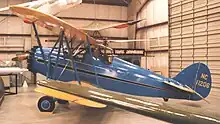
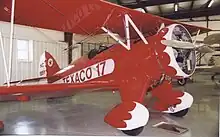
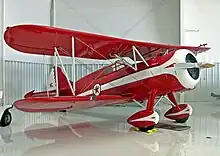
_arrives_RIAT_Fairford_10thJuly2014_arp.jpg.webp)
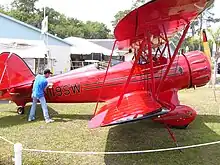
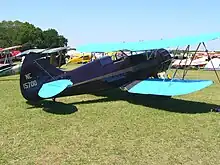
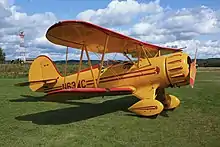
The 'F' series was popular with private owner pilots for sporting and other uses and continued in production through the late 1930s. The tandem cockpit UPF-7 was adopted by the Civilian Pilot Training Program and continued in production until 1942 by which time over 600 had been built.[2]
The 1934 model YMF was substantially redesigned with a longer and wider fuselage, larger rudder and other structural changes, and put into production in March 1986 by WACO Classic Aircraft of Lansing, Michigan as the YMF-5.[1] Over 150 YMF-5s were completed as of 2017 with new examples being built to specific orders.[3]
The WACO Aircraft Company of Ohio Inc had built three replicas by December 2011, which they designated MF.[4]
Considerable numbers of 'F' series biplanes, both original and newly built, remain in service.
Variants
Listed in approximate chronological order (per Simpson, 2001, p. 573) First letter of designation refers to engine installed. From 1936 Waco added year suffixes to designations—e.g. YPF-6, YPF-7, with the numeral being the last digit of the model year.
- INF
- 125 hp (93 kW) Kinner B-5, certified ATC# 345 on 2 August 1930.
- KNF
- 100 hp (75 kW) Kinner K-5, certified ATC# 313 on 12 April 1930.
- RNF
- 110 hp (82 kW) Warner Scarab, certified ATC# 311 on 7 April 1930.[5]
- PCF
- 170 hp (130 kW) Jacobs LA-1 and new cross-braced undercarriage, PCF-2 certified ATC# 473 on 2 October 1931
- PBF
- as PCF with 'B' wings
- QCF
- 165 hp (123 kW) Continental A70, QCF-2 certified ATC# 416 on 9 April 1931
- UBF
- 210 hp (160 kW) Continental R-670
- UMF
- 210 hp (160 kW) Continental R-670A and longer and wider fuselage, and larger fin
- YMF
- 225 hp (168 kW) Jacobs L-4
- YPF-6 and YPF-7
- 225 hp (168 kW) Jacobs L-4
- ZPF-6 and ZPF-7
- 285 hp (213 kW) Jacobs L-5
- UPF-7
- tandem trainer with wide-track undercarriage and 220 hp (160 kW) Continental R-670 (designated PT-14 by the USAAC)
Waco Classic Aircraft replicas
- YMF-5
- 1986 design roughly based on the YMF, built by WACO Classic Aircraft
- YMF-5D
- 2009 improved YMF-5[3][6]
- YMF-5F
- YMF-5 with Aerocet 3400 amphibious floats[7]
Operators
Military operators
- Guatemalan Air Force - At least 1 Waco YMF-7 received in 1934. Was still in airworthy condition in 1998.[9]
- United States Army Air Corps - Adopted the UPF-7 as the PT-14, with one XPT-14 and 13 YPT-14s being purchased, with an additional UPF-7 impressed in 1942 as a PT-14A.[10]
- United States Navy
Specifications (UPF-7)
Data from The Aircraft of the World[2]
General characteristics
- Crew: 1
- Capacity: 1 trainee or passenger
- Length: 23 ft 1 in (7.04 m)
- Wingspan: 30 ft 0 in (9.14 m)
- Height: 8 ft 5 in (2.57 m)
- Wing area: 244 sq ft (22.7 m2)
- Empty weight: 1,870 lb (848 kg)
- Gross weight: 2,650 lb (1,202 kg)
- Powerplant: 1 × Continental W-670-6A seven cylinder radial , 220 hp (160 kW)
Performance
- Maximum speed: 128 mph (206 km/h, 111 kn)
- Cruise speed: 114 mph (183 km/h, 99 kn)
- Range: 400 mi (640 km, 350 nmi)
- Service ceiling: 14,800 ft (4,500 m)
- Time to altitude: 15 min to 9,000 ft (2,700 m)
References
- Notes
- Simpson 2001, p. 573
- Green & Pollinger 1965, p. 307
- WACO Classic Aircraft (2009). "Own the Dream". Archived from the original on 2012-03-11. Retrieved 2009-06-12.
- Vandermeullen, Richard: 2012 Kit Aircraft Buyer's Guide, Kitplanes, Volume 28, Number 12, December 2011, page 76. Belvoir Publications. ISSN 0891-1851
- Al Hansen (Spring 2004). "The Waco Model F". AAHS Journal.
- Grady, Mary (June 2009). "Waco Updates Its Classic Biplane". Retrieved 2009-06-25.
- WACO Aircraft Corporation (2021). "YMF-5". wacoaircraft.com. Archived from the original on 15 December 2021. Retrieved 18 February 2022.
- "Waco". Aerofiles.com. Retrieved 2012-08-23.
- Sloot and Hornstra Air International January 1999, pp. 55, 57.
- Swanborough and Bowers 1963, p. 535.
- Bibliography
- Green, William; Pollinger, Gerald (1965). The Aircraft of the World (3rd ed.). Macdonald & Co. (Publishers) Ltd.
- Simpson, Rod (2001). Airlife's World Aircraft. Airlife Publishing. ISBN 1-84037-115-3.
- Sloot, Emile; Hornstra, Luc (January 1999). "Fueza Aerea Guatamalteca". Air International. Vol. 56, no. 1. pp. 55–58.
- Swanborough, F. G.; Bowers, Peter M. (1963). United States Military Aircraft since 1909. London: Putnam.
- Swanborough, Gordon; Bowers, Peter M. (1976). United States Navy Aircraft since 1911 (Second ed.). London: Putnam. ISBN 0-370-10054-9.
External links
 Media related to Waco F Series at Wikimedia Commons
Media related to Waco F Series at Wikimedia Commons